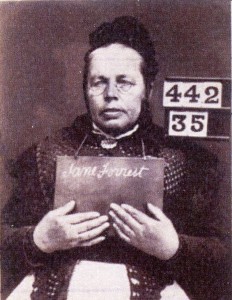Pinpoint Ancestry
Bringing your family's past to life
Tag Archives: mental health
Image courtesy of National Records of Scotland, Crown Copyright NRS HH/21/48/2/44
I was interested to attend this year’s special exhibition at the National Records of Scotland set to coincide with the Edinburgh International Festival entitled ‘Prisoners or Patients?: Criminal Insanity in Victorian Scotland’ as it is a topic we at Pinpoint Ancestry have published two books about: Lunatics, Imbeciles and Idiots (2017) and Madness, Murder and Mayhem (2018).
Running from 1 to 31 August 2019 in the Matheson Dome of General Register House at the east end of Princes Street, it is a small but fascinating exhibition and very much reveals how archival records can be used to illuminate the stories of a select number of prisoner-patients who were admitted to the Criminal Lunatic Department of Perth Prison (equivalent to England’s Broadmoor Hospital).
The discipline of psychiatry was in its infancy at this time. Mental health was poorly understood. There is debate as to whether the inmates were treated as prisoners rather than patients. Through the case histories of eight patients, the exhibition examines each individual story, and evaluates how their mental illness touched their own lives and the lives of their families. In each case there are archival documents including legal documents (precognitions and court records), medical records, and prison records which help illustrate their stories.
At Pinpoint Ancestry we have been particularly interested in this aspect of the history of mental health. We have looked at the development of asylums in nineteenth century Britain and the greater understanding of the treatment of mental health disorders. Originally called ‘mad doctors’, they were renamed ‘alienists’ before finally the modern term ‘psychiatrist’ became used.
As part of the special exhibition, on 30 August 2019 we are privileged to be giving a talk at New Register House in Edinburgh entitled ‘Researching Criminal Lunatics: exploring archives’. Admission is free but attendees should book prior to the event on eventbrite.
Dr John Burt
I have spent the last few years researching the rich archive of case notes for patients admitted to asylums in nineteenth century Britain and Ireland. Many people have commented that they cannot imagine why I would be so interested in such a grim topic – am I mad myself? Perhaps I am – but the research has led me to co-write a book on the subject entitled ‘Lunatics, Imbeciles and Idiots: A History of Insanity in Nineteenth Century Britain and Ireland’, which I hope people will enjoy.
As a genealogist, I am naturally interested in any source of information that provides details about the identity and lives of others in the past. And, asylum case notes are a particularly rich source of ancestral information including photographs, hereditary illness within family and importantly first person accounts of how mental health disorders affected their lives and wellbeing.
The majority of genealogical sources provide a snapshot of a family on a specific day whether that be a baptism, marriage, burial or a census return. Medical case notes however, allow us to follow the lives of individuals on a daily or weekly basis for as long as they remained within the asylum. A good example of this is the case of Esther Eliza Taylor who was admitted to Parkside Asylum in Macclesfield, Cheshire in 1887. Her case notes reveal that Esther was wilful, stubborn and abusive towards her mother who was clearly at the end of her tether. However, as well as providing details of Esther’s mental health problems, the case notes also give details of her father who is described as ‘an inveterate drunk who had convulsions as a child’. Similar convulsions affected all of his children.
Hundreds of thousands of individuals were admitted to lunatic asylums in the nineteenth century. Many were discharged deemed to be recovered, but others remained there for life. Due to social stigma, episodes of insanity within a family are quickly ‘forgotten’ or brushed under the carpet. Subsequent generations may have no idea that their ancestor was once admitted to an asylum. But, for those of us with an inquiring mind, and let’s face it, most genealogists would describe themselves as nosy, these records are available for research.
The quickest way to determine if you had a ‘lunatic’ ancestor is to check the UK, Lunacy Patients Admission Registers, 1846-1912 on Ancestry. The patient case notes are held at county archives, but some collections have been digitised and are available to view online. Cheshire Archives and Local Studies have made their collection of Parkside Asylum case notes freely available using this method.
In order to highlight what a rich source of information these records are, my co-author Dr John Burt and myself will be giving a joint presentation at Who Do You Think You Are Live at the NEC in Birmingham on 7 April 2017.
+ Contact Information
Kathryn Burtinshaw M.Sc., Q.G
Pinpoint Ancestry
9 Spring Gardens,
Rhosddu,
Wrexham,
LL11 2NX
United Kingdom
Tel: 07576115513
+ Contact Information
Kathryn Burtinshaw M.Sc., Q.G.
Pinpoint Ancestry
9 Spring Gardens,
Rhosddu,
Wrexham,
LL11 2NX
United Kingdom
Copyright (c) 2023 Pinpoint Ancestry. All rights reserved.










